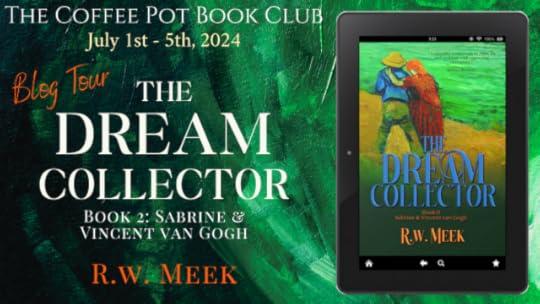Virginia Crow's Blog: Crowvus Book Blog, page 11
July 18, 2024
#HistFicThursdays - Things to Inspire - Books
There is a line in the remake of The Parent Trap when the man (who owns a vineyard) is showing his former wife his collection of special wines: "I'm a man of limited interests". That is sort of like me with books! I have accumulated quite a few old books and it's not just because I love books.
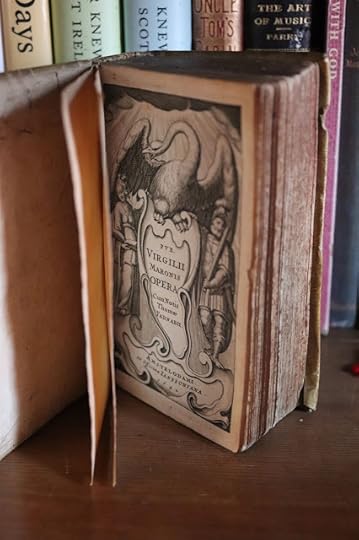
Our oldest complete book is the one above. It predates most of the settings for my books, the Jacobites, and the Great Fire of London. There is something very exciting about thinking about the different people who have read it over the years! I got it because it links in with one of our family's favourite books, The Children of Green Knowe.
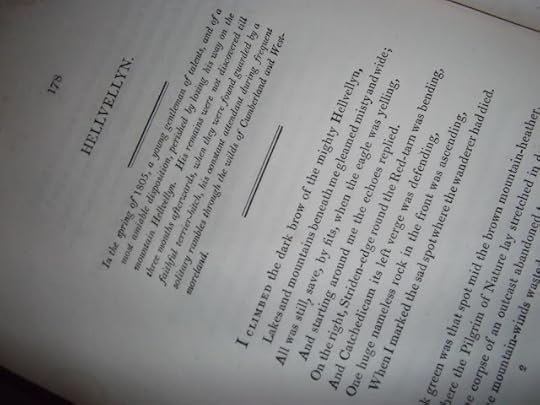
And then there are books which directly impact on my own writing. My sister bought me a first edition of Walter Scott's Ballads and Lyrical Pieces, a book which is gifted in my own story Day's Dying Glory. It is amazing to be able to hold the book, getting an idea of things beyond the words: the weight of the paper; the size of the margins where short notes can be written; the intricate swirls and colours of the cover's inside...
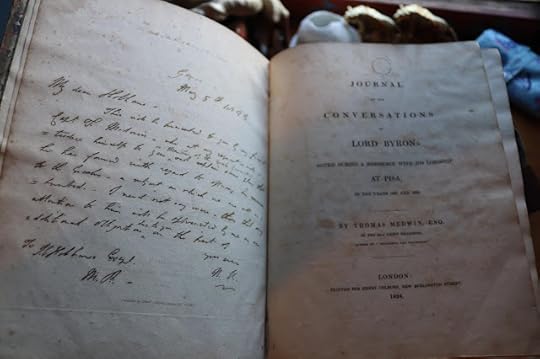
And, of course, there are those old books which indulge other aspects of my interests. These interests - as mentioned in last week's blog - go on to inspire my writings in one way or another.
So I think it is not only sensible but also right to gather old books, and certainly a great source of inspiration for an historical fiction writer. Not only do we get to hold the same object we are setting into the hands of our characters, we also get to see the stories and the instructions people received through books then. Remember: all these books were an inspiration to someone back in the day too, or they would never have been published!
July 11, 2024
#HistFicThursdays - Poetry - The Tenterchilt Saga
What do you say when people ask you if you like poetry? It's one of those questions where a single word answer just does not work for most people. Like all artforms - writing included - poetry is hugely subjective. But, when you do find a poem you love, it can be one of the most inspiring things of all.
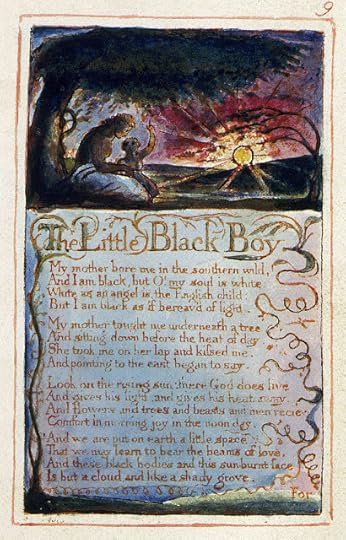 Blake's original plate for The Little Black Boy
Blake's original plate for The Little Black BoyMy family saga draws constantly from poetry. I love the poetry of the Romantics - Byron in particular - and their poetry weaves in and out of the books, right down to the titles: Day's Dying Glory (from Byron's Lachin y Gair); and Beneath Black Clouds and White (from Blake's The Little Black Boy). I'm someone whose writing style is rather sumptuous (or should that be: overindulgent?!), and these flowery poems of depth and flow serve to add to my inspiration and also find a common ground between me and my characters, for whom they are contemporaneous.
The way we interact with words can say a great deal about about us. Where nonfiction writers use words to inform, and prose writers use words to project, poets paint with words. I like to believe there a poem form everyone out there, and similarly one for every character - all beautifully different. So, spill the beans, what is the most inspirational poem you've ever read?
July 4, 2024
#HistFicThursdays - The Dream Collector: Sabrine and Vincent van Gogh - R. W. Meek - Book Excerpt
Today for #HistFicThursdays, I am delighted to be sharing a book excerpt from R. W. Meek's fabulous new book! I'm once again teaming up with The Coffee Pot Book Club to share a sample of the The Dream Collector: Sabrine and Vincent van Gogh!
First of all, let's meet the book...
Sabrine, hospitalized for five years at the infamous Salpêtrière Asylum for Women, gains her release due to intervention of her sister Julie Forette and a young Sigmund Freud. The reunited sisters are introduced to the dazzling art milieu of 1886 Paris, and soon become close friends to the leading Impressionists. Sabrine attracts a cult following as a poetess, the enigmatic "Haiku Princess." Seemingly cured by Freud of her Grand Hysteria, Sabrine soon enters into a tumultuous relationship with Vincent van Gogh.
Julie and Sigmund Freud, alarmed by the eerie parallels between the emotionally volatile couple and their self-destructive impulses, begin an urgent search to discover the root causes for Sabrine and Vincent's growing psychoses. Julie, 'The Dream Collector' seeks their most unforgettable dream for Freud's interpretation and revelations occur.
The Dream Collector is an exploration of the psychological consequences of betrayal, abandonment--and the redemptive power of art.
You can buy The Dream Collector: Sabrine and Vincent van Gogh is available on #KindleUnlimited via this link.(How gorgeous is this cover?!)
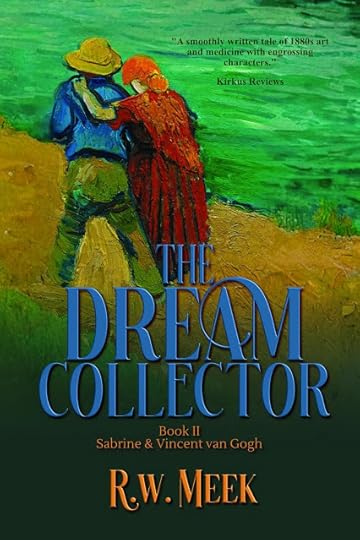
And here's an excerpt to whet your appetite:
“Returning to the Nest”
AS f.f. and I found our way to Sabrine’s door, we heard loud tapping from inside. Entering, we quietly set our presents down, transfixed: Sabrine was busily hammering a bird’s nest to the wall. When finished, she began rummaging inside a large, wood crate at her feet where more nests were deeply stacked. As she was still unaware of our presence, we gazed at her handiwork.
The wall had become a tableau of nests, of varying sizes and colours, hung in artistic patterns. There were pin wheels, undulating waves, and even nests so remarkably assembled that they resembled musical notes. It seemed as if she had imagined her own firmament—but replaced stars with nests.
f.f. cleared his throat to signal we were in the room. “May we be of humble assistance?” he queried.
Not at all surprised by our presence, she held out a nest made of fine hay straw. “Oh, yes! You can reach much higher than I.”
“Only in the most literal and mundane sense; but first...” He took off his top hat and removed his kid gloves before taking the nest, peering inside. “Any leftover eggs to be concerned about?”
“Oh, Vincent and I never took nests where there were eggs or baby birds.”
We put the mention of Vincent aside. I sat down on the floor, next to my sister, inspecting the various nests inside the crate. I simply did not want her to know that Vincent had voluntarily committed himself to the Saint Paul Asylum.
Now, let's meet the author:
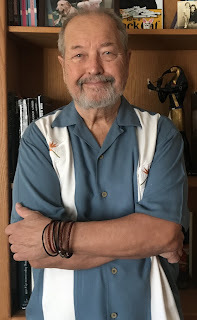 R.w. Meek has a Master’s degree in Art History from the American University in Washington, D.C., his areas of expertise are Impressionism and Post-Impressionism, with a particular interest in Vincent van Gogh.
R.w. Meek has a Master’s degree in Art History from the American University in Washington, D.C., his areas of expertise are Impressionism and Post-Impressionism, with a particular interest in Vincent van Gogh. His first novel The Dream Collector “Sabrine & Sigmund Freud” was voted runner-up by the Historical Fiction Company for best novel of 2022.
Born in Baltimore, he currently resides with his wife Pamela in Santa Clarita, California. He’s passionate about art, cinema, literature and jazz. His two dogs, Reve and Banjo, were awarded angelic status in heaven.
You can find the author on these links:
Website - Facebook - Amazon Author Page - YouTubeTo follow the rest of the tour for The Dream Collector: Sabrine and Vincent van Gogh, click on the banner below:
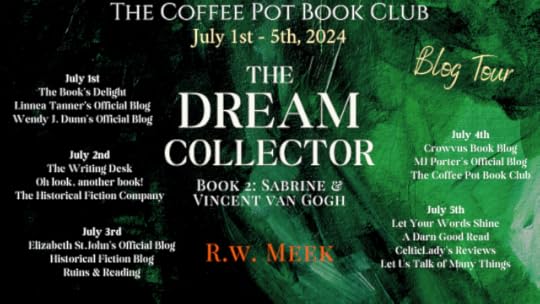
June 27, 2024
#HistFicThursdays - Things to Inspire - Maps
For NaNoWriMo last year, I wrote a book called The Stonemason's Crown. This was in part inspired by a discovery I made whilst poring over a map. It was not an old map, but a map of old things using LiDAR technology. For Christmas, my sister got me a copy of that map, printed on metal and zoomed in on the very spot where my story was set.
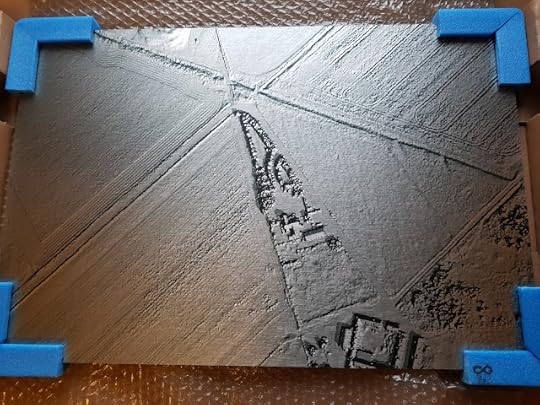
Maps give an amazing insight. Not only do they point out landmarks which are sometimes long gone and forgotten, they also show how people reacted with - and believed in - the world where they lived. Where would our imaginations be without etched sea serpents, or "Here Be Dragons" on the edges of these documents? Time was I would only read books which had a map in them. I've got a little bit more accepting now, but I still get a real buzz as a reader to find a beautiful map tucked into the opening pages of a book.
My dad loves maps. Consequently, I have always found them fascinating. He has quite a collection, some which are hundreds of years old, including a (somewhat sooted up!) 17th Century map of part of the country which is in need of a deep clean before anything can be properly made out. But what a great spark for the imagination, wondering who would have had it made and for what purpose. It is the human side of the past which speaks to historical fiction writers and readers, and there are dozens of stories to every point on every map.
Because much of what I write is now set in the real world, I have to admit to largely overlooking the need for maps, but maybe it is time to hand-draw one and see if I can include it in one of my books. Perhaps, if The Stonemason's Crown is ever published, there will be one in there...
June 20, 2024
#HistFicThursdays - The Calling of Aonghas Caledon - Free Short Story
Caledon has appeared many times. This story introduces Caledon's sixth incarnation...
The Calling of Aonghas Caledon
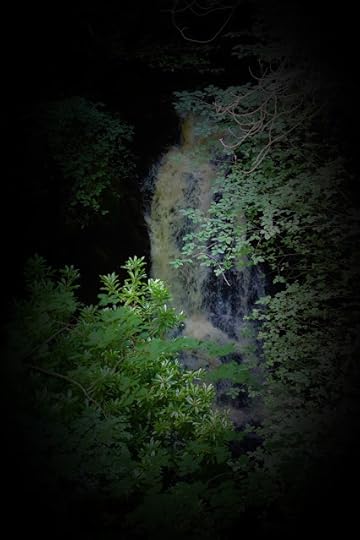
“There’s an evil abroad in the world,” croaked the minister from the front of the kirk.
Aonghas heard him, but thought nothing of the words. He was not a covenanter. He was more inclined toward papist tendencies, but he had been employed as a bodyguard to Thomas Geddes, the man who now occupied the seat in front of him. And Aonghas went where the money was.
He looked out the window and idly wondered what force would await them there. Surely, nothing could be as bad as Dalwhinnie. Men had lined up there, women too, with torches and farming implements to attack the small band of covenanters as they left the church. There had been a small skirmish, but no one had been killed. Aonghas and John had got Thomas Geddes to safety, and the pious man had continued northward.
But the deeper they passed into the Highlands, the more tenacious the crowds became. Dornoch had been a reprieve, strangely quiet for such a large place. But they had left Dornoch two days ago. Now they were in Golspie.
At last, the service ended. There was no blessing as Aonghas could remember from his childhood experiences of church, instead there was a warning. It was a warning against Rome and the evils which spread from there. And from London.
He walked to the door and pulled it open.
There was no one there. Birds sang in the trees. There was a calming drone of insects, and the world seemed utterly at peace.
Aonghas chewed the side of his mouth thoughtfully. Something about this harmony was more disquieting than the rows of mattocks and burning torches had been. He stepped out and looked around. For a moment he imagined he could see himself standing in the church doorway. What a confused figure he was, running away from poverty at any cost, selling his soul for the benefit of a few coins. He almost felt ashamed of himself. Almost.
Motioning for Thomas to follow, he and John walked into the endless sunshine of the late summer day. It remained quiet. John held the reins of Thomas’ horse, and Aonghas offered his hands to the older man who slotted his foot into the cupped gesture, taking to the saddle with an air of diminishing grandeur. He patted his hand against his sacred cargo and, reassured it was safely stowed, moved his horse forward. John and Aonghas flanked him on foot.
They were approaching a small ford over a burn, when Aonghas stopped. Nothing in the landscape had changed. The birds still sang, people were still absent from the road. But something was different.
Thomas turned an angry expression to his bodyguard, lashing out with the whip he carried. Aonghas gripped his shoulder and stared up at the man on horseback, mustering all his restraint to remind himself that this man paid his wage. This momentary lack of self-control turned into surprise as he heard the popping sound of a musket shot and watched in disbelief as Thomas fell from his horse. John snatched the reins while Aonghas leaned over Thomas.
Thomas made a sickening sound each time he tried to breathe through his punctured throat. Aonghas found himself trying to calm the same man who, only moments earlier, had wounded him. Thomas was reaching towards the horse, desperately trying to communicate something, but unable to speak.
“The Covenant will reach the coast,” Aonghas promised. “It will be taken to all corners of the land.”
Thomas’ mouth twitched slightly, the closest to a smile Aonghas had ever seen on that face, before he relaxed into a contented death.
“John,” Aonghas whispered.
“Is he dead?”
“Yes. Did you see who shot him?”
“They ran up the burn. I only saw a shadow.”
Aonghas rose to his feet and looked across. John returned his gaze with a glimmer of fear on his usually hardened features.
“Keep travelling north,” Aonghas commanded, feeling confused at his own sudden decisiveness. “His dying wish was for the Covenant to be made known to all corners of the land. For good or ill, he believed in it.”
“I’d say it was ill for him. What are you going to do?”
“Find who did this. They’ve robbed me.”
“For God’s sake, Aonghas,” came the frantic reply. “I’ll pay you myself if you’ll come.”
“This is your quest now, John. We both know I never believed in it anyway. Blend into the landscape, then you’ll be safe.”
Aonghas watched as John departed, crossing the burn and leading the horse towards Dunrobin castle. When his friend had faded from sight, Aonghas followed the burn upstream.
John had pointed in this direction when he spoke of the assailant but, the further Aonghas went, the more he became convinced John was mistaken. There was a quality to the air, fragrant, rich, almost too pure to withstand. Something was happening here; or had happened; or, which frightened him to consider, was going to happen. He eased his dirk from its sheath and peered around the corner of the gorge. The burn was quicker here, as he traced it back towards its source, and there was a different sound now. It was continuous and forceful, yet somehow light and vibrant, too. He glanced over his shoulder, unsure whether this new sound was hiding an assailant. But he was alone.
The further he walked, the greater the sound became, until he began to imagine it was his blood racing through his body. He felt exhilarated, giddy even, and struggled to maintain his usual cautious gait. He paused at another bend in the gorge and leaned against the rock wall. He listened, trying to capture anything but the driving sound, which he was now sure were rapids. The gorge seemed dark, but rainbow lights were beckoning him around the corner. Clutching the dirk and exhaling to steady his racing mind, Aonghas peered around the wall of the ravine.
The weapon fell to the ground and, in abject terror and awe, so did Aonghas.
Before him was a pool whose waters were frothy and bubbled. It reflected the beautiful blue sky above, slightly browned with the peaty water. Trees overhung it and sheltered the banks of the burn, their verdant leaves lush and resplendent. But it was not this which had caused Aonghas to fall to his knees.
At the opposite side of the pool, stretching the full height of the ravine, ran a cascade which was more than a waterfall. As Aonghas watched, horrified yet spellbound by the apparition, it tensed its watery fingers and seamlessly moved away from the rocks. Two cavernous eyes opened in the continuous stream. Aonghas realised he was trying to speak, endeavouring to form words which would express his fear and disbelief, but the sounds were garbled and senseless.
“Rise, Aonghas Caledon. Why do you kneel before your destiny?”
“Destiny?” Aonghas repeated, the word strange upon his tongue. “I came searching for a murderer.”
“Then look in the pool, and you shall find one.”
Aonghas looked around him, trying to convince himself it was not the waterfall who had spoken. But he was alone. He crawled forward to the pool and stared into it. For a moment, the movement of the water obscured his vision, and he felt dizzy as he beheld the faintest echo of his own appearance.
“I’m not a murderer,” Aonghas protested, pushing himself to his feet and glaring across at the waterfall.
“Open your eyes,” the waterfall’s voice commanded. It spoke directly into his head, as though a telepathy existed between them. “You are no longer Aonghas Rothach. You must become Aonghas Caledon. Open your eyes,” it repeated.
As though intentionally, although Aonghas tried to remind himself that waterfalls could not have intentions, water splashed into his face. He screwed his eyes closed, and rubbed his hands over them.
He gasped, holding his hand out before him, searching for anything to support him. His vision was no longer on the waterfall. Somehow, he was on the banks of the sea. A huge castle rose from a rocky outcrop. It looked deserted and quiet, except for one woman. She stood at the door, pounding upon it. Her fiery hair rippled over her otherwise naked form. If there was anyone in the castle, they ignored her. Another woman walked towards her, wrapping a blanket about her shoulders and guiding her away.
Aonghas moved through the grasses, which seemed taller than any he had ever known, hoping to gain a better view. He shook his head quickly, opening his eyes to find himself, once more, at the pool.
“What was that?” he stammered. “Where was I?”
“That is your enemy. You see them because your Eile watches them.”
“My Eile?” Aonghas demanded.
“That tongue you have long forsaken is evergreen in the memory of Caledon.”
“My other?” Aonghas breathed, recalling the time and distance which had passed since he had last used his native language.
“He will protect you, as you must protect him. The very spirit of Caledon is within those beasts.”
Aonghas watched as a marten skulked down a tree at the side of the ravine. It stopped before him, and Aonghas found himself once again experiencing the strange sensation of watching himself. It was as though the marten truly did share his gaze. It padded forward and rose to stand on its hind legs, studying him thoughtfully.
“This is madness,” Aonghas laughed, stepping away and facing the waterfall which was now returning to the rocks.
“Madness?” its voice echoed. Was there a hint of anger to its otherwise detached tone? “Madness is what the people of Caledon are subjecting themselves to. What is the Covenant to a son of Caledon? Your fight is not of papist or covenanter. Your fight is for the sons and daughters of Caledon. There is an evil abroad in the world.”
“I’ve heard those words already today.”
“I do not speak of a side in a battle of opinion. I speak of a side in a battle for Caledon’s survival. Your first quest is upon you, Aonghas Caledon. Drink from the waters of the Healing Spring, and take a phial that you may use it when it is needed. They shall find you. They shall be drawn to you, as you were drawn here. Your quest beckons, Caledon.”
It did not matter how much Aonghas begged for some great explanation, the waterfall had returned to its dormant form. The marten had gone and Aonghas was alone. The world seemed darker now. Was it just the passage of the sun in the sky? Or was it the promised threat of the women he had seen through the marten’s eyes? He picked up the dirk and pushed it back into its sheath.
The man who stepped out of the gorge may have looked the same as the man who, only an hour earlier, had entered, but Aonghas knew he was not the same person. He returned to where he had left his employer’s body, but it was to find someone had already removed the corpse. Aonghas looked around him nervously. He could hear the steady beat of men’s feet coming towards him, and he froze as someone called out.
“There he is! The murderer!”
Aonghas ran. He sped along the road, faster than the militia behind him could move. How foolish to be shot for a crime he was only guilty of trying to solve. He stumbled to a halt as the track opened onto a rocky beach. There was nowhere to hide. He moved back to the treeline, but his pursuers were almost upon him. He had no time to hide.
“Take the rope!” hissed a voice from above him. He looked up in confusion. “Just take it!”
Aonghas snatched the tail of rope which was dangling beside him, and he was hoisted from the ground. He had barely reached the wide branch, when the first of the militia rushed into view below him. As soon as he was safely on the tree’s limb, his rescuer placed a finger over his lips. Aonghas followed his advice and peered down as the soldiers rushed along the path, down to the coast, and towards Dunrobin. Aonghas counted eighteen men and, only when all eighteen had disappeared from view, did the man before him speak.
“What are you doing in Golspie?” he demanded. “You’re not welcome here.”
“Show me the road away and I’ll go,” Aonghas retorted. “But first: thank you.”
“You’re not like your master.”
“My master?”
“The man who was shot.”
“He wasn’t my master,” Aonghas replied, determined to correct this mistake. “He was my employer. How do you know I’m not like him?”
“Intuition,” came the amused reply. The man placed the rope around the branch and lowered himself down. Aonghas followed his example, but felt his face crease in concern as his rescuer picked up a musket and began walking away.
“Did you shoot him?”
“Yes,” came the honest reply, one Aonghas was unprepared for. He was surprised to find he no longer wanted retribution for the death, just explanation.
“Why? You didn’t know him.”
“That would take too long to explain.” The man’s broad shoulders hunched, and he looked ashamed. “And they’d have me burnt in a tarred barrel before daybreak.”
“Witchcraft?” Aonghas hissed, recognising the sentence. “You don’t look like a witch.”
“I’m not. Though-” The man paused and studied him. “You’re a fugitive now. If you help me, I’ll help clear your name.”
“How so?”
“I was the one who shot him. But no,” he sighed, continuing along the path. “This is my quest.”
“No, this is madness,” Aonghas laughed, bringing an angry look from the other man. “My quest beckons? That’s who those women were: Witches?”
“You’ve seen them?” He took Aonghas’ shoulders and stared down. “They have my daughter. They have Janet. They were set to kill her if I didn’t strike down the man named Caledon.”
“What?” Aonghas snapped.
“One of them, Black Maggie she’s known as, said Caledon would rise if he was not stopped by the ford. She had seen his future, that’s her gift. And she said she’d burn Janet and scatter her ashes to the four winds if I failed. What does that even mean?”
The man before him was becoming almost hysterical, and Aonghas nodded slowly. “I’ll help you defeat them, and free your daughter. But I want something more than a pardon in return.”
“What do you want?”
“In time,” Aonghas said with a smile. “I need to know whether I’m right, first.”
The pair journeyed inland. Aonghas’ new companion introduced himself as Neil, a farmer of his own land. He told Aonghas that the witches had arrived in the early summer. At first, Neil had simply avoided them, but when the crops had failed and the livestock become sick, he had confronted them. This had been a mistake. They had come in the night and stolen his daughter from her bed. They had demanded he kill the man who travelled from the south, or they would kill Janet.
They camped on the side of the ben, sleeping in the open air, and staring up at the stars. But it was far from idyllic as the midges gathered. Aonghas pulled his thin coat over his head and tried to hide from Neil’s snores and the biting insects.
The moment he opened his eyes, he knew he was dreaming. He was standing in a huge banqueting hall. Dancers spun and candlelight filled the air. He heard running water and found that, instead of a fire, the waterfall filled the hearth.
“Tread carefully, Caledon,” its disinterested voice began. “Beware Providence. She is the first of many and she will know you when she sees you. Only fire or mirrors can destroy her. You must act quickly.”
“Providence? What does that mean?” Aonghas watched as the world splintered, and realised he had been staring in an enormous mirror. All he had believed to be true was only a reflection.
“Take a shard, Caledon, and use it.”
Aonghas stepped forward and pulled out a fragment of the shattered glass. He turned to look at the room, but it was drab, dark and lifeless. All the beauty of the reflection had been a lie.
He jumped awake as he felt something brush past his head. A chattering laugh, entirely inhuman, mocked him as he watched the marten. With its curved back lunging it forward, it leapt towards Neil, but turned to Aonghas as he hissed across at it.
“Wait!” he began, only pausing for a moment to question why he was addressing a mustelid. “He can’t know yet, or he’ll kill me!”
“What?” Neil asked sleepily, rolling on his shoulder so his waking eyes met Aonghas’. The marten had vanished. “What happened to your hand?” Neil added, stifling a yawn.
Aonghas looked down at the trickle of blood which ran from his clenched fist. Opening out his palm, he faltered as his eyes rested on his own reflection in a shard of mirror. He shook his head in disbelief, wiping the blood down his coat, before he tucked the sharp mirror safely into the pocket on his belt. What was the meaning of a waking dream?
They continued their journey and, by midday, reached Neil’s farm. It stood in a wide valley, whose walls enclosed it on all sides. There was only a thin pass by which they could enter without climbing high up the ben.
“It’s all ours,” Neil said, a proud smile catching his features.
“We’ve passed dozens of crops,” Aonghas pointed out as they walked towards the mains in the centre of the valley. “All were healthy.”
“Which is why I know this is witchcraft,” Neil agreed, crumbling an empty ear beneath his fingers. “Black Maggie is known here. She comes down through the valleys when she is looking to recruit new women for her coven. I’m afraid that’s why she’s taken Janet.”
“I’ll get your daughter back,” Aonghas promised, the words falling from his mouth before he had a chance to check them.
Neil looked across at him in genuine surprise.
“You’re a mystery to me, Aonghas. You don’t know me. Why are you so willing to help me?”
“I know it’s right.”
Neil offered him half a smile and walked towards the mains once more.
The farmhouse was large, with a parlour and a kitchen, as well as the living area. It was in the parlour that Aonghas waited, while Neil looked though the house, searching desperately for his daughter. Eventually, he returned to Aonghas, his confused expression full of pain.
“I don’t understand it. I killed the man. I did what she wanted. I’ve risked everything. Why is Janet not here?”
“You cannot make deals with them,” Aonghas said softly. He suspected his presence, indeed his very life, was the reason Neil could not find his daughter. But if he told the man that, Aonghas was unsure Neil would allow him to remain alive.
“Who is Caledon?” Aonghas asked. “I knew the man you killed as Thomas.”
Neil shrugged his shoulders and turned as a painfully slow knock sounded on the front door. Aonghas watched as all colour bled from Neil’s face and the older man rushed to the front of the house. He heard him pull open the door, and Neil’s voice cracked as he spoke to the person who stood there.
“Where’s my daughter?”
“May I come in?” The voice which spoke these words was young and sweet, as unlike a witch as Aonghas could imagine. “I set you a challenge, did I not?”
The voice came closer, and Aonghas realised she had entered the house.
“I shot that man,” Neil snapped back. “The militia can tell you. Caledon is dead.”
“You shot an innocent man. For, last night, I saw the hall of Caledon fill once more with light.”
“What?”
“You failed me.” She detached the words with such ferocity, Aonghas peered through the crack in the door to ensure his companion was unharmed. “And I have spoken already to Sutherland’s men. They know you are guilty.”
“What?” Neil repeated. “Where’s Janet?”
“I’ll make sure she is there to see you hang. Caledon lives,” she muttered, turning to look out the window. “And since you failed to kill him, your life will be forfeit.”
“Let me see my daughter,” Neil pleaded, catching her hand and kneeling before her.
Aonghas felt his hand tighten on the shard of mirror and quietly cursed as it drew blood from his fingertip. He had hardly made a sound, but Black Maggie turned towards the parlour. She lashed out at Neil but never looked at him. Instead she walked towards the parlour door.
“There is only one can deceive providence.”
Aonghas turned as he heard a scratching above his head and found the marten. It was on one of the beams but, as soon as its eyes met his, it raced to a pile of grain sacks in the corner of the room. Aonghas rushed over, burying himself within them as Black Maggie stepped into the parlour. Through the hessian, he could see her purse her lips, while her eyes scanned the room.
“Stealth,” she whispered, hissing out the word. “Caledon’s stealth alone could blind providence.”
She turned back to Neil, who had followed her into the room.
“There’s no one here,” he muttered, trying to hide his surprise.
“I am Providence,” she snarled in reply. “My foresight does not lie.”
Aonghas tried to steady his heart as it pounded. This was Providence? The providence he had been warned to beware? Surely it had not been coincidence that the mirror had come into his grasp when he beheld her.
He watched as Black Maggie turned to Neil, raising her hand. Aonghas did not know what was going to happen. He had never met a witch before. Afraid of what she was about to do to this man, who Aonghas had blindly sworn to help, he pushed aside the sacking.
“Even Caledon cannot be worth Janet’s death.” Neil backed away from her hand.
“All who honour Caledon before my sisters deserve death. Caledon must never rise again. If you had listened, you might have granted your daughter her life.”
Neil’s eyes locked on Aonghas’ own. Seeing this, the witch turned to face this new assailant. To Aonghas’ great surprise, her primary expression was one of fear, causing his hand to falter as he pulled back the shard. At this delay, her expression lifted in a smile.
“You cannot be him. You have not the stealth to defeat me.” She held out her other hand and Aonghas realise he could no longer move his arm. The mirror, the one weapon he had against the woman before him, was pinned in place by her magic. She smiled cruelly at the two men, both captives of her witchcraft.
“I’ve changed my mind,” she laughed. “You shall watch your daughter die the death you tried to inflict on me.”
She turned to the door where three women entered. Neil gave a sob as his eyes rested on his daughter. From Neil’s words, Aonghas had expected Janet to be a child, but he felt his jaw drop at the beautiful young woman who was being held tightly by the other two newcomers. Neil demanded, begged and fought for her release. Ignoring him, Black Maggie walked forward and plucked the mirror from Aonghas’ helpless hand. She moved over to Janet, who stubbornly willed herself not to cry.
Aonghas shook himself back to his senses. Black Maggie had removed her spell, but Aonghas was unsure he could get to her in time to stop what was about to happen. He rushed forward, grabbing the witch’s hand, but it only delayed the inevitable as he felt one of the other women grip his wrist. A cold numbness seeped up his arm. He watched the mirror move towards Janet’s chest.
As the second spilt into a thousand moments, he questioned why he should be so interested in the outcome of this fight, and sought for anything he could do to save Janet. His vision faded, but he was not succumbing to darkness, only swapping to the eyes of the marten as it leapt upon the witch who held him. In the brief moment of panic which ensued, Aonghas grabbed Black Maggie’s hand and pushed the mirror into the witch’s throat.
“I am Caledon,” he hissed, staring vehemently into the eyes of the woman. “And I will destroy your sisters.”
There was a cry then. A shriek so ear-piercingly inhuman that Aonghas covered his ears and the marten chattered in a displeased way. When Aonghas lowered his hands, it was to find the other two women had disappeared. Black Maggie’s wide eyes, frozen in the horror of death, stared up at him.
“It worked,” he laughed, looking down at the marten and, through its eyes, remembering that he was not alone in the room.
Neil stared across, his eyes full of wonder. He was gripping Janet to him, and she stared at Aonghas with the same expression as her father.
“I am Caledon,” Aonghas whispered, feeling slightly embarrassed.
“Caledon?” Neil opened his mouth to say more but stopped as he heard a pounding on the door. “The militia,” he breathed. “I will take the consequence for my crime. But to have laid eyes upon you, Caledon, I have a hope for the future. Protect Janet, I beg you.”
Neil walked from the parlour.
All the tears Janet had manged to withhold against the witch, fell as she gripped Aonghas’ hand and knelt before him.
“Caledon, please. My father’s crime was not of his own doing. She made him. Can’t you see?”
Aonghas nodded quickly, placing a hand on her hair and smiling.
“Wait!” he called out, rushing after the departing men who were already marching Neil away. “This was the most malign witchcraft.”
“Witchcraft?” repeated one of the men, turning to face Aonghas.
“He did shoot Thomas Geddes,” Aonghas continued. “But he was possessed by a witch, whose body is now in the house. Black Maggie.”
“Black Maggie?” someone hissed, while another muttered, “She will kill us all.”
“No,” Aonghas said frantically, watching as they readied the muskets they carried. He turned back to the house to see Janet staring with disbelief at the guns, which were all pointed at her. Without considering his actions, Aonghas rushed to stand in front of her, holding his hands out to try and block the shots.
Gunfire echoed from the high hills around the valley.
Aonghas blinked. He looked doubtfully down at himself, wondering if any of the balls had found their target. He was unscathed. He looked towards the men as they lowered their weapons. Between him and the militia lay the gasping figure of Neil. Aonghas rushed forward, and Janet did the same.
“She’s inside, you fools,” Aonghas snarled at the men. “This is his daughter.”
Two of the soldiers walked into the house to corroborate his words, but Aonghas hardly noticed. He held Neil’s head as Janet clutched her father’s hand, kissing it repeatedly.
“What did you do that for?” Aonghas muttered.
“You have a duty to fulfil,” Neil replied, each word taking several seconds to form. “Caledon.”
“And you must live to help me.”
Aonghas turned as he realised he was being watched, expecting to find the marten beside him. Instead, beyond the corner of the house so only he could see it, stood a stag. Its eyes weighed heavy on his shoulders and, feeling as though it was too much to bear, he dropped his hand to his side. It fell into the pocket on his belt, and his fingers drew out the small phial which contained the water of the Healing Spring.
“It’s true, sir,” began one of the soldiers, returning from their search of the house. “Black Maggie is there.”
Aonghas heard these words but never took his eyes from the man before him. He opened the phial and gently tipped the contents into Neil’s mouth, willing himself to have correctly understood its power. The stag tipped back its head and bellowed, deep and resonate, but no one else seemed to hear it. Or perhaps Neil did, for his eyes opened slightly, and Aonghas gave a mystified smile.
As the leader of the militia walked to stand before him, Aonghas rose to his feet.
“Who are you, sir? To kill the witch who has tortured our lives these fifteen years? What reward would you seek?”
“Reward?” Aonghas laughed slightly. “None but a pardon for this man. And my name is Caledon.”
June 12, 2024
#HistFicThursdays - Katharine's Remarkable Road Trip - Gail Ward Olmsted - Book Snippet
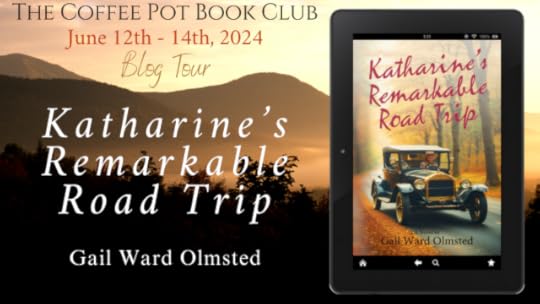
This week for #HistFicThursdays, I'm delighted to once again be teaming up with The Coffee Pot Book Club for author Gail Ward Olmsted's blog tour! Today, I'm sharing an excerpt from her fabulous brand new release, Katharine's Remarkable Road Trip!
First of all, let's meet the book...
In the fall of 1907, Katharine decides to drive from Newport, Rhode Island, to her home in Jackson, New Hampshire. Despite the concerns of her family and friends, that at the age of 77 she lacks the stamina for the nearly 300-mile journey, Katharine sets out alone. Over the next six days, she receives a marriage proposal, pulls an all-nighter, saves a life or two, crashes a high-society event, meets a kindred spirit, faces a former rival, makes a new friend, takes a stroll with a future movie mogul, advises a troubled newlywed, and reflects upon a life well lived; her own!
Join her as she embarks upon her remarkable road trip.
Katharine Prescott Wormeley (1830-1908) was born into affluence in England and emigrated to the U. S. at the age of eighteen. Fiercely independent and never married, Kate volunteered as a nurse on a medical ship during the Civil War, before founding a vocational school for underprivileged girls. A lifelong friend and trusted confidante of landscape architect Frederick Law Olmsted, she was a philanthropist, a hospital administrator, and the author of The Other Side of War: 1862, as well as the noted translator of dozens of novels written by French authors, including Moliere and Balzac. She is included in History’s Women: The Unsung Heroines; History of American Women: Civil War Women; Who’s Who in America 1908-09; Notable American Women, A Biographical Dictionary: 1607-1950 and A Woman of the 19th Century: Leading American Women in All Walks of Life.
You can buy Katharine's Remarkable Road Trip via this Universal Link
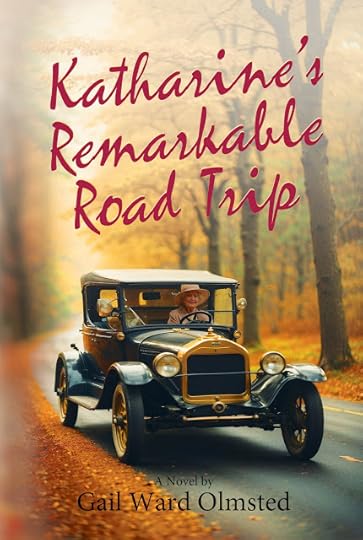
And here's a snippet to whet your appetite:Katharine’s (semi-solicited) advice to a troubled newlywed
I am probably the last person qualified to give relationship advice. But since you’re asking me, I’ll tell you what I think. Go home. Not to your parents’ but to the home you share with Charlie. Talk to your husband, but wait until he’s had a bath after work. And maybe serve him a special dinner too. It’s much easier to talk to someone who’s well-fed. I know what you’re thinking. You’ve got a little one to keep fed and clean and now you’ve got Charlie, too? Dear, I’m not saying you must run his bath or cook a three-course meal every night, but you both have a job to do. Currently, his is to go to work every day in a factory that I can only imagine is loud and dirty, get his weekly pay, put food on the table and keep a roof over your heads. Yours is equally important, but for the time being, lacks much in the way of tangible rewards. But it's vital work. Caring for your son, tending to your home, loving your husband: it’s all very important. She seemed unconvinced, so I tried a different, more direct approach.
What I’m saying in a nutshell is, it’s time to grow up. You chose to get married, and that comes with responsibilities. You’re not playing house, my dear. Real life is hard and now you’ve got a third person added to the equation. One that relies on you for absolutely everything. You are his entire world. You must tell Charlie what you need from him and, at the same time, assure him you’re quite capable of running the house and caring for your son. Can you do that, Hannah?
Now, let's meet the author:
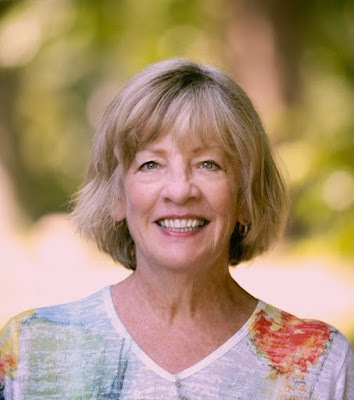 Gail Ward Olmsted was a marketing executive and a college professor before she began writing fiction on a fulltime basis. A trip to Sedona, AZ inspired her first novel Jeep Tour. Three more novels followed before she began Landscape of a Marriage, a biographical work of fiction featuring landscape architect Frederick Law Olmsted, a distant cousin of her husband’s, and his wife Mary. After penning a pair of contemporary novels featuring a disgraced attorney seeking a career comeback (Miranda Writes, Miranda Nights) she is back to writing historical fiction featuring an incredible woman with an amazing story. Watch for Katharine's Remarkable Road Trip on June 13th.
Gail Ward Olmsted was a marketing executive and a college professor before she began writing fiction on a fulltime basis. A trip to Sedona, AZ inspired her first novel Jeep Tour. Three more novels followed before she began Landscape of a Marriage, a biographical work of fiction featuring landscape architect Frederick Law Olmsted, a distant cousin of her husband’s, and his wife Mary. After penning a pair of contemporary novels featuring a disgraced attorney seeking a career comeback (Miranda Writes, Miranda Nights) she is back to writing historical fiction featuring an incredible woman with an amazing story. Watch for Katharine's Remarkable Road Trip on June 13th.
You can find Gail on these links:
Website - Twitter - Facebook - Instagram - Book Bub - Amazon Author Page - Goodreads
To follow the rest of the Katherine's Remarkable Road Trip tour, click on the banner below:
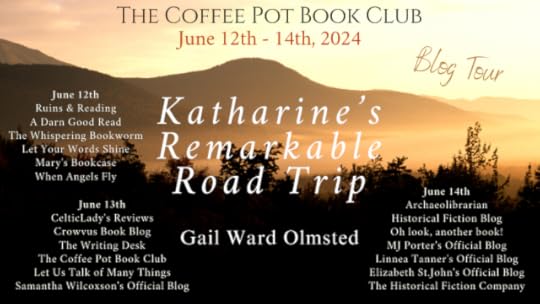
June 6, 2024
#HistFicThursdays - Landscape and the Natural World - Caledon
I'm not a nature writer - I don't know nearly enough to pass myself off as one! But, as this month marks the #30DaysWild campaign, I thought I'd take you on a guided tour of some of my own observations of the natural world and how they impacted on my historical writing...

First of all, there was that walk which led to the creation of Caledon. Yes, I've blogged about it so often I won't repeat it all again! But there are things in nature which capture your imagination. The Big Burn waterfall was one of those things for me. Writing the discovery which James made was easy to do because it was just how I had felt. Here it is:
Somewhere, only a short distance from him, the sound of a waterfall could be heard, both heavy and gentle in a manner which made his head throb even more. It was the hard work and efforts of these falls which had carved out the ravine where he lay. The trees which had broken his fall on his way down, clung to the sheer sides and gave the April sky a peculiar criss-cross with their branches which, though budding, had not yet come into full leaf. He realised it was no longer raining. The ground around him was dry save for the spray from the waterfall which he noticed, with interest, was coming into view. He lifted his head up and, though it spun when he moved, he was surprised to find he was able to rise. At first, he felt his eyes were betraying him, and he screwed them closed before opening them once more, but the peculiar form of the waterfall was indeed beginning to take shape. Two hands with long watery fingers reached away from the rock and rolling from side to side on wide though fragile shoulders an ever-changing head appeared. It was queer, the manner in which this form looked so alive in its monochrome appearance, and James Og gave a slight cry as two large eye sockets appeared.
But with this shared experience comes a flipside! Writing Historical Fiction means that you have to take into account changes in the landscape. There were not lovely wooden bridges then, no cleared paths. Care had to be taken not to slip because there were no wooden rails to catch you. And this was not only a consideration for The Big Burn. The entire landscape was changed with the Clearances and industrialisation. Trying to reimagine what the terrain had been like was an important part of telling the story.
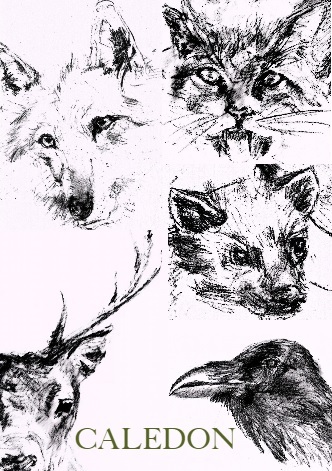
And then there are the Eile, the animals which filled that world. It was difficult to pick only six, and I knew they had to have been in Scotland for long enough to have been present at all of Caledon's incarnations.
One of them had to be the wolf. The disappearance of wolves in the landscape is emblematic of mankind's impact on the landscape, making Strength's wolf the last one around.The pine marten was a must, and there is no creature quite like it! Writing in a character for it great fun!Zeal's wildcat, a creature on the verge of extinction was also a poignant character as I can see a time when Caledon's wildcat will outlive the rest of its species.The raven draws from the Norse myths surrounding them, but it is also my attempt at addressing the approach to ravens today. They are so seeped in legend, have the beautiful partnership of lifelong mates, and yet are viewed as little more than pests.Of course, there had to be a stag: The Monarch of the Glen! These days, over-population of deer is a problem in the Highlands and it is leading to fewer good specimens of these rather splendid animals, so there is a very definite distinction made between Nobility's stag and those you find today.And I couldn't resist the sixth one! After all, it is one of the creatures which has captured hearts from around the world, bringing thousands of tourists to the Highlands every year. We never outgrow the fascination!One of the great things (and also one of the most complicated!) about writing historical fiction is that the relationship man had with the landscape was wholly different. There was a respect, management, and harmony between humanity and the natural world. It was a perfect balance. Now, that management has turned into dominance.
So, whatever your time period or your setting, bear in mind how the landscape was approached and what it gave back to the people of your stories. Think about the animals and plants they would have known and recognised and watch out for the anachronisms of slipping things in out of place - there will always be readers who spot them if they're there! This June, try to find as many areas as you can which have been unaltered since the time you're writing about. Listen to the sounds, capture the smells, and write them all into those tricky scenes to help bring them to life!
Happy Writing!
May 30, 2024
#HistFicThursdays - Just a Little Thank You: You Are Awesome!
I can't believe we are almost at the end of #HistFicMay! I have had a fabulous time and feel like I have made many new discoveries in the realm of Historical Fiction.
Finding your place as a writer can be really difficult, but when you have a great network behind you it is a hundred times easier! If you have found this blog you will know that my family - a family full of writers! - are my closest team, but I could not have achieved all I have today without the support and help of the fabulous Historical Writers Forum.
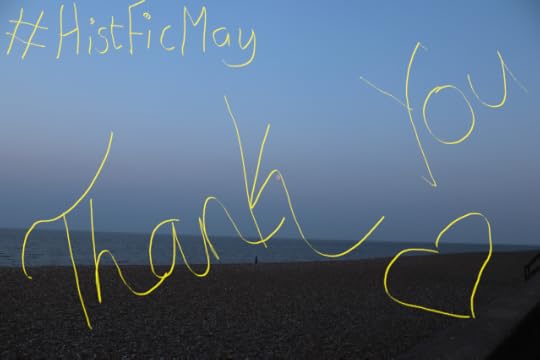
I created #HistFicMay because I wanted to give something back to my network of fellow historical writers. I hope I have done just that!
So, please have a look at the #HistFicMay tag across social media. We're on Twitter/X - Facebook - BlueSky - Instagram - Threads - and perhaps other platforms which I'm not a part of. I promise you that you will find fabulous writers with incredible books.
Writers, there is a fabulous network for historical fiction. I can't stress strongly enough how great it is to connect with your peers. We are all in this crazy world of storytelling together. It's brilliant being a writer, but it is also pretty tough - let no one tell you otherwise - which is why it's so great to find kindred spirits!
[Next year's prompts will be appearing next April 😁]
May 22, 2024
#HistFicThursdays - Their Castilian Orphan - Anna Belfrage - Guest Post
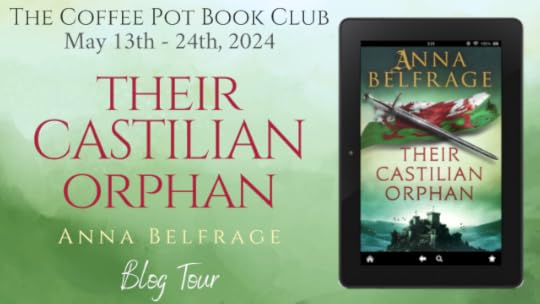
For this week's #HistFicThursdays blog, I'm thrilled to be welcoming Anna Belfrage back to the blog with a guest post about her latest book Their Castilian Orphan, as part of her Coffee Pot Book Club tour. In her guest post, Anna explores the character of the contentious Edward I and shares his role in her story. But first, let's meet the book...
Blurb
It is 1294and Eustace de Lamont is back in England after five years in exile. He willstop at nothing to ruin Robert FitzStephan and his wife, Noor d’Outremer.
Robert’s halfbrother, Eustace de Lamont, has not mellowed during his absence. He is moreruthless than ever, and this time he targets Robert’s and Noor’s foster son,Lionel.
Lionel isserving King Edward as a page when Eustace appears at court. Not only doesLionel become the horrified witness to Eustace’s violent streak, Eustace alsostarts voicing his suspicions about Lionel’s parentage. The truth aboutLionel’s heritage is explosive—should King Edward find out, all would be lostfor Robert and Noor.
In October of1294, Wales rises in rebellion. Robert must leave his family unprotected tofight the Welsh rebels on the king’s behalf, comforted only by the fact thatEustace too is called to fight.
Except thatEustace has no intention of allowing his duty to his king—or a mererebellion—come between him and his desire to destroy Robert FitzStephan . . .
Their Castilian Orphan is available on #KindleUnlimited via this Universal Link
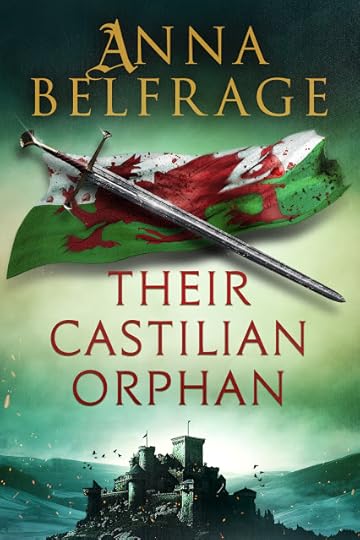
Guest Post
Edward I is a king that generally inspires a lot ofambivalence—especially among those who took Braveheart as gospel truth,the brave William Wallace destroyed by the bitter, evil English king. Somewould therefore wonder why I have chosen to make him a central character in myseries The Castilian Saga. Beyond the fact that the events in TheCastilian Saga occur during Edward’s reign, thereby automatically makinghim someone I needed to relate to, I have always been fascinated by this king,by the dichotomy of his cruelty in some situations and his evident capacity fordeep love in others.
Indubitably, Edward was horrifyingly cruel during hiscampaign in Scotland. Little can excuse imprisoning women from cages hung frombattlements or the gory execution of William Wallace, condemned to be hanged,drawn and quartered before an enthusiastic audience in London. In Scotland, theageing English king gave no quarter—at least not to those he considered to havebetrayed him.
However, judging Edward based on Scotland alone is notfair.
“Hang on,” someone will say. “What about Wales? He waspretty harsh there too!”
That he was—but nowhere close to as ruthless as he wasin Scotland. Not that Elisabeth Ferrers, wife to Prince Dafydd ap Gruffydd,would necessarily agree: her husband was also condemned to be hanged, drawn andquartered in Shrewsbury, and she had her children torn from her arms, her babydaughter sent off to live out her life in a nunnery, her two young sons carriedoff to Bristol Castle to be locked up for life. Cruel. Absolutely—especiallywhen one considers that the older of Dafydd’s son, the fourteen-year-oldLlewellyn, was kept in a cage at night.
Still, leaving aside the tragic fate of Prince Dafyddand his family, Edward was never quite as roughshod in Wales. Not even afterthe rebellion in 1294—when he himself was severely humiliated by the Welshrebels who ambushed him, carried off his baggage train and left him no optionto turn tail and make as fast as possible for the safety of Conwy Castle—werepeople condemned to die as cruelly as Dafydd or Wallace. Instead, the rebelleader Madog ap Llewellyn was locked up for life.
All in all, though, Edward comes across as being nostranger to violence when so required. In the case of Scotland, he had no legalright to meddle, although he would snort and tell me not to be a fool if hewere to read that. The chaotic situation after the death of Alexander III inScotland offered an opportunity to Edward, a chance to expand his kingdom. Ofcourse he grabbed that opportunity with both hands! Besides, he’d likely add,his intention was to annex Scotland peacefully, by marrying his son, Edward, toMargaret the Maid of Norway, the only surviving heir to Alexander’s throne.Unfortunately, Margaret died on her way to Scotland, and suddenly there werevery many pretenders to the Scottish crown. Obviously, Edward would tell us, hehad to act to safeguard his own realm.
Wales—well, here Edward would argue north Wales was agigantic burr up the English arse. Plus, most of Wales was already happilypacified and ruled by English marcher lords. The exception was Gwynedd, and howwas it Edward’s fault that Dafydd, ungrateful rogue that he was, instigated therebellion that would cost the lives of Llywellyn the Last (Dafydd’s olderbrother) and Dafydd himself while leaving Gwynedd ripe for the taking? Theconflict with Wales was personal: not only had Llewellyn the Last supportedSimon de Montfort when he rebelled against Henry III, but Dafydd had beenraised in the English court, had repeatedly sworn fealty to Edward, only toturn around and betray him the moment he was dissatisfied with his lot. (As anaside, Dafydd was often dissatisfied, which was why he betrayed not only Edwardbut also his brother)
Thing is, Edward was a medieval king. He livedin a day and age where kings could not afford to show weakness, and Edward hada very personal experience of just what could happen to a weak king—namelySimon de Monfort’s rebellion against Henry III, Edward’s father.
Henry was no great king, and he was easily influencedby people around him, perhaps especially by his forceful wife, Eleanor ofProvence. Edward would never commit the mistake of involving his wife in theactual ruling, no matter that he seems to have respected and greatly loved hiswife, Eleanor of Castile.
Simon de Montfort was Edward’s uncle, he was marriedto Henry’s sister, Eleanor (Yes, I know: very many Eleanors to keep track of)He was also a skilled soldier, charismatic and much more of a traditionalmedieval male role model than Henry, who was much more interest in art than inwar.
Initially, Edward seems to have felt some sympathy forde Montfort’s ideas—the notion of a representative Parliament (representativeused loosely, as only a very small part of the English were called to attend)resonated with him, as did the notion of restricting the influence offoreigners. Henry had been far too generous to his French half-siblings and hiswife’s Savoyard relatives, angering the English nobles.
When the tensions between de Montfort and hissupporters versus the king and his men exploded into civil war, Edward sidedwith his father. Suddenly, those ideas of de Montfort threatened Edward’sinheritance, and he was not having that. Ultimately, de Montfort lost. Thingsreturned to “normal”—albeit Henry, counselled by Edward, showed restraint whenpunishing all those who’d joined the rebels.
The years of civil war were to leave Edward determinedto never, ever find himself in a situation similar to that of his father. Thebest way to avoid that was, of course, to strike first—especially against thosewho potentially could succour would-be rebels. Hence his harsh approach toWales and Scotland.
For me, Edward ismuch more than a ruthless warrior. He is a man who loved his first wife sodeeply he was totally devasted by her death—for the first time ever during hisreign no work was conducted during three days, the king struck down by grief.He was a father who had welcomed sixteen children to the world, only to loseten before they were adults. (He had three more with his second wife) He wasthe man called upon to negotiate some sort of peace between France, Aragon andthe papacy after the utter mess that was the French attempt to invade Aragon in1285. He negotiated a treaty with Baibars, allowing Christian pilgrims to visitthe Holy Land. Most of all, he was a man determined to be strong because hisfather had been weak, thereby plunging the kingdom into bloody disarray. Noton my watch, Edward would likely say, no way!
Now, let's meet the author:

Had Anna been allowed to choose, she’d have become a time-traveller. Asthis was impossible, she became a financial professional with three absorbinginterests: history, romance and writing. Anna has authored the acclaimed timetravelling series The Graham Saga, set in 17th centuryScotland and Maryland, as well as the equally acclaimed medieval series TheKing’s Greatest Enemy which is set in 14th century England.Anna has just released the final instalment, Their Castilian Orphan,in her other medieval series, The Castilian Saga ,which is set againstthe conquest of Wales. She has recently released Times of Turmoil,a sequel to her time travel romance, The Whirlpools of Time, andis now considering just how to wiggle out of setting the next book in thatseries in Peter the Great’s Russia, as her characters are demanding. . .
All of Anna’s books have been awarded the IndieBRAG Medallion, she hasseveral Historical Novel Society Editor’s Choices, and one of her books won theHNS Indie Award in 2015. She is also the proud recipient of various Reader’sFavorite medals as well as having won various Gold, Silver and Bronze CoffeePot Book Club awards.
“A master storyteller”
“This is what all historical fiction shouldbe like. Superb.”
You can follow Anna on these links:
Website - Newsletter - Twitter - Bluesky - Facebook - Instagram - Book Bub - Amazon AuthorPage - Goodreads
Keep up with the rest of the Their Castilian Orphan tour stops by clicking on the banner below: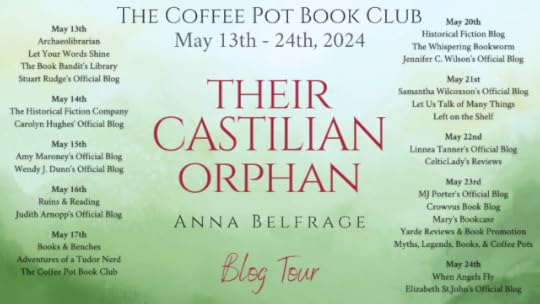
May 16, 2024
#HistFicThursdays - Things to Inspire - Rules and Regulations
Yesterday, the #HistFicMay prompt asked what was the trickiest thing about a setting. There were some great answers from Historical Fiction authors, which you can read here. For my part, the answer was this:
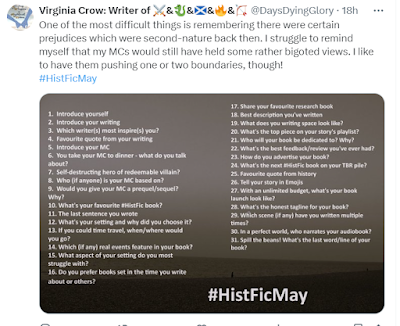
When I write a book, I inevitably fall in love with one of my characters. But then there is that nagging annoyance that they are (well, not real, for a start) almost certainly influenced by their time and society. And those days were filled with adventure, but they were certainly not filled with justice and fairness.
Not all rules applied to all people, of course, and my "things" which I have collected for this topic are actually as much linked to the military nature of my Family Saga as they are to rules and regulations. These are from the Napoleonic era and relate to the advancements made by the Duke of York - yes, he was the Grand Old one!
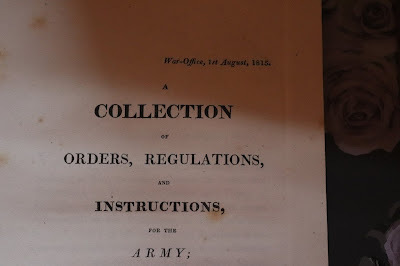
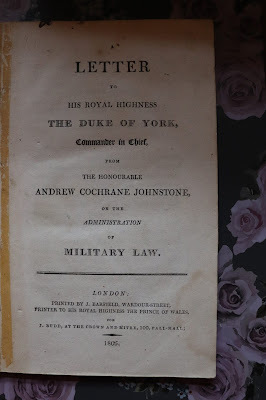
But, while your characters might have to abide by the laws of the land, remember there have always been people who stand up for different beliefs. In Beneath Black Clouds and White, I explored the advent of abolition, and it was very challenging indeed to include good characters who were not in favour of it. I think I managed to balance it in the end!
Happy Writing!
Crowvus Book Blog
- Virginia Crow's profile
- 128 followers


